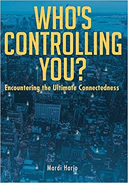
 |
Who’s Controlling You? Encountering the Ultimate Connectedness
by Mardi Harjo
Christian Faith Publishing
Christian artist and musician Harjo has constructed a thorough, thoughtful treatise focusing on the ideal relationship between human beings and God. She begins with a basic view of that relationship, questioning the reader in clear, rational terms. Do we worship the stars or God who made them? Do we believe that worldly knowledge can save us, or must we look beyond, to an "authoritative Truth that cannot be compromised"? In what do we base our identity? What is our ultimate, utmost purpose? By this means, the author stretches the mind beyond its usual realms of spiritual examination. She is not eclectic but selective in her guidance towards leading a God-centered life. She decries some televangelism as a kind of religious "junk food" and suggests that certain sorts of worship emphasize apparent miracles and wonders rather than their source. She warns that one can be a "nominal" Christian who simply takes in a few spoonsful of religion on a regular basis with the appeal of elaborate rituals, a phenomenon she calls "churchianity."
To get to the heart of the Christian experience, we must recognize the reality of our common heritage: sin and corruptibility. Harjo asserts that we all share these traits but that it is crucial to understand that God didn't make us that way. An error to which some people fall prey is blaming God for misfortunes and failures. Harjo illustrates how this tendency could manifest by candidly recounting her own life experience and, specifically, her feelings of trauma and almost unbearable sorrow at the suicide of her eldest son, a decorated military veteran. She had to pass beyond the feelings of anger or regret that assail us at such cataclysms and instead take comfort in the bliss that would await her son's "battle-scarred soul" when he enters paradise.
Harjo's perceptions are remarkably wide-ranging, and, though underpinned by biblical references, her narrative is refreshingly free of the sort of sect-based preaching that characterizes some religious works. In reading her book, one discovers humor, history, personal confessions, appropriate exhortations, and an engaging conversational treatment. As a music writer and producer, she seems to have easily and skillfully translated the gift of communicating with a listening audience into the realm of the printed word so that the reader can imagine simply sitting with her and conversing on this significant subject matter. Steeped in Jewish wisdom also, she effectively conveys the importance of God's choice of the Israelite people to carry forth His word before the advent of Jesus. She believes that man's willingness to murder the Messiah is comparable to the worst incidences of genocide. Jesus, she says, "always cuts to the chase," presenting us with unpalatable but undeniable truths and leaving it to us to accept or reject them. She also offers the comforting advice that such acceptance can be a long process, with continuing lessons to be learned. Harjo's book is powerful, encompassing multiple religious issues, and can be studied by anyone who seeks to understand life and live it to its godly fullest.
RECOMMENDED by the US Review
Next Focus Review
Previous Focus Review